 Macrovision, a company who sell content protection (DRM) system, have today released a report they commissioned into content copying.
Macrovision, a company who sell content protection (DRM) system, have today released a report they commissioned into content copying.
The findings? That ‘Casual Piracy’ is “a Growing Challenge in the Entertainment Industry” and that “mass market penetration of digital recording devices and broadband/file-sharing networks are prompting many entertainment brands to enrich their content protection strategies and influence bottom line performance.”
Let us translate. Digital Rights Management (DRM) is coming and the public had better start getting used to it.
 This is on the basis of what to us appears, from a quick once over of this report, a pretty unscientific approach, as the following paragraph from page 10 illustrates.
This is on the basis of what to us appears, from a quick once over of this report, a pretty unscientific approach, as the following paragraph from page 10 illustrates.
“In order to estimate exactly what effective content protection represents, respondents were also asked to estimate how many units/titles were copied (burnt) for each 100 sold and how many were illegally downloaded for every 100 sold.”
How can someone write “estimate exactly” without seeing the paradox? They just have well asked them “How paranoid are you about content copying?”
Their conclusion directly under this nonsense? “None of the figures make for comfortable reading.” WHAT?!?!? Just because these figures are presented in a table in a report with graphs next to them, doesn’t elevate them from what they are – guesses. At this point we stopped reading this report – we had some drying paint that needed watching.
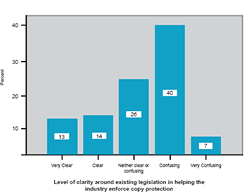 I hope that each time a ‘report’ or so called research like this is published, that it is gone through with a fine tooth comb pointing out its weaknesses. This kind of nonsense needs to be countered.
I hope that each time a ‘report’ or so called research like this is published, that it is gone through with a fine tooth comb pointing out its weaknesses. This kind of nonsense needs to be countered.
FUD rules
I have, for years, been questioning the content industry – How are you going to sell DRM to the public when what you’ll be selling them some less good/useful than they had before? The answer has always been a resounding silence.
When I asked a very senior person at Fox (his name escapes me) why DRM would be required when the vast majority of their customers are fair, reasonable and trustworthy, his response stunned me – “We take the opposite view, we treat everyone as dishonest.”
To me, that summed up both the arrogance and distain of the company, and possibly that of the current ‘entertainment’ industry. Any company that has such a low opinion of their customers, will eventually come to a sticky end – and it’s quite right that they do.
Through the sheer panic of suddenly waking up to the changes that technology has been bringing to media for decades (hell, I had digitised audio tracks on my Mac Plus, soon after it was released in 1984), the ‘entertainment;’ business has been listening to technology companies, who by strange co-incidence have something to sell – content protection systems.
That combined with the universal truth that fear is contagious, leads to a point where we are now. The current media companies being near terrified that _all_ of the customers are waiting to steal from them, so they must be restricted – and DRM-selling companies are more than happy to help them in their fear.
Their perceived need to restrict their customers is costing them _huge_ amounts of money and it will continue to … and to what gain?
They stop their customers from using their purchases how they feel fit – well, at least until the latest hack removes the protection – and in the process, further alienate their customers, building resentment.
Why don’t they spend all of this effort, time and money creating new content – engaging their audience further?
I wonder if the ‘entertainment’ companies have spared a thought as to what would happen if their businesses did fail? Do they not see that generally the technology companies are going to win anyway even without them?
PDF of complete report.
BTW, don’t try copying text out of the report, it’s protected unsurprisingly.
 UPDATEDSky has today confirmed that it is offering £211m to buy publicly listed UK ISP, Easynet. This follows a period of general speculation, after Easynet issued an official statement on Monday past that they were subject to a possible offer.
UPDATEDSky has today confirmed that it is offering £211m to buy publicly listed UK ISP, Easynet. This follows a period of general speculation, after Easynet issued an official statement on Monday past that they were subject to a possible offer.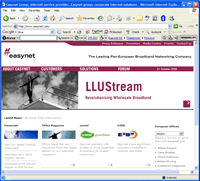 Sky will gain income from broadband subscription and possibly entice further subscribers to their TV service taking them to their stated aim of 10m. Far more important is a new channel to deliver content through – one they have total control over. They like that.
Sky will gain income from broadband subscription and possibly entice further subscribers to their TV service taking them to their stated aim of 10m. Far more important is a new channel to deliver content through – one they have total control over. They like that. Sky have been mulling about an IPTV service for a while. They were in discussions with THUS who provide the telecoms back-end for their SkyTalk service and helped Sky with their WapTV services, they were talking about doing an IPTV trial with THUS, but THUS pulled out of the LLU arena due to lack of cash. They were looking at spending £20m+ on just a trial.
Sky have been mulling about an IPTV service for a while. They were in discussions with THUS who provide the telecoms back-end for their SkyTalk service and helped Sky with their WapTV services, they were talking about doing an IPTV trial with THUS, but THUS pulled out of the LLU arena due to lack of cash. They were looking at spending £20m+ on just a trial.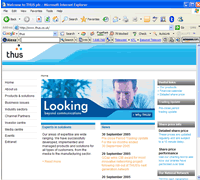 Sky are also in an odd position as they’ll probably utilise MPEG-4 as the coding system, which means they’ll have to modify (or supplement) their existing transmission systems which are all based on MPEG-2. They’ll also have to introduce a new IP based set-top-box. However they’ll have to be carefull as to not make it too feature rich compared to existing STB’s used to decode the satellite transmissions or existing users will want to migrate to the broadband version – which will cost Sky a huge ammount as the exisitng boxes are considerably subsidised.
Sky are also in an odd position as they’ll probably utilise MPEG-4 as the coding system, which means they’ll have to modify (or supplement) their existing transmission systems which are all based on MPEG-2. They’ll also have to introduce a new IP based set-top-box. However they’ll have to be carefull as to not make it too feature rich compared to existing STB’s used to decode the satellite transmissions or existing users will want to migrate to the broadband version – which will cost Sky a huge ammount as the exisitng boxes are considerably subsidised. Figures just out from the OECD (Organisation for Economic Co-operation and Development), report 137m broadband subscribers throughout the OECD countries and that’s up 18m since the last figures, six months ago.
Figures just out from the OECD (Organisation for Economic Co-operation and Development), report 137m broadband subscribers throughout the OECD countries and that’s up 18m since the last figures, six months ago.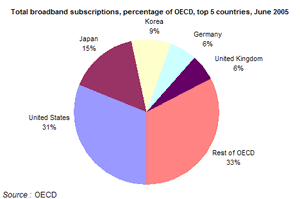 The ‘other technologies’ have enjoyed the the highest percentage growth in the past six months, growing 13%.
The ‘other technologies’ have enjoyed the the highest percentage growth in the past six months, growing 13%. Sony are keen for us to ‘redefine’ our living rooms with the release of their new VAIO XL1 Digital Living System, a twin box offering combining a high-end multimedia PC with a 200-disc media changer/recorder.
Sony are keen for us to ‘redefine’ our living rooms with the release of their new VAIO XL1 Digital Living System, a twin box offering combining a high-end multimedia PC with a 200-disc media changer/recorder. A similar process takes place for movies, where an in-depth synopsis and star, cast, director and producer details etc are automatically downloaded and made accessible onscreen through the included wireless keyboard or remote control.
A similar process takes place for movies, where an in-depth synopsis and star, cast, director and producer details etc are automatically downloaded and made accessible onscreen through the included wireless keyboard or remote control. There’s no denying that the recording functionality seems mighty impressive to us, with the XL1 able to automatically and sequentially record up to 200 audio CDs from the media changer to the hard drive.
There’s no denying that the recording functionality seems mighty impressive to us, with the XL1 able to automatically and sequentially record up to 200 audio CDs from the media changer to the hard drive.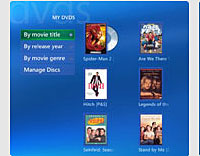 To ensure that your late night listening pleasure isn’t spoilt by the sound of a mass of Boeing 747-like fans starting up, the XL1 system uses liquid-cooled components for quiet operation.
To ensure that your late night listening pleasure isn’t spoilt by the sound of a mass of Boeing 747-like fans starting up, the XL1 system uses liquid-cooled components for quiet operation. There still seems to be plenty of cash slopping around the broadband sector, as PIPEX has just waved its weighty wad in the direction of Freedom to Surf (F2S) and bought the company for £10m.
There still seems to be plenty of cash slopping around the broadband sector, as PIPEX has just waved its weighty wad in the direction of Freedom to Surf (F2S) and bought the company for £10m.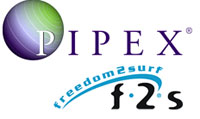 It’s uncertain whether existing Freedom2Surf customers already using LLU via the EasyNet LLUStream range will stay where they are or be shunted on to a PIPEX LLU product.
It’s uncertain whether existing Freedom2Surf customers already using LLU via the EasyNet LLUStream range will stay where they are or be shunted on to a PIPEX LLU product. Peter Dubens, Chairman of PIPEX, said: “In the light of our recent decision to unbundle an initial 60 exchanges, we are very pleased to add F2S to the PIPEX group, which will further increase the density of customers around each exchange, thus improving the return on capital and enabling us to offer higher speeds to a greater number of our customers. F2S’s customers will be able to benefit from our extensive network and the broad range of services we provide.”
Peter Dubens, Chairman of PIPEX, said: “In the light of our recent decision to unbundle an initial 60 exchanges, we are very pleased to add F2S to the PIPEX group, which will further increase the density of customers around each exchange, thus improving the return on capital and enabling us to offer higher speeds to a greater number of our customers. F2S’s customers will be able to benefit from our extensive network and the broad range of services we provide.” As the next-generation DVD wars between HD-DVD and Blu-ray Disc grind on, Paramount Home Entertainment has employed a time-honoured fudge and announced that it will be offering movies in both formats.
As the next-generation DVD wars between HD-DVD and Blu-ray Disc grind on, Paramount Home Entertainment has employed a time-honoured fudge and announced that it will be offering movies in both formats. Both formats serve up far more storage capacity than current DVD discs, with HD-DVD offering 15GB or 30GB and Blu-ray Disc 25GB or 50GB, depending on the disc.
Both formats serve up far more storage capacity than current DVD discs, with HD-DVD offering 15GB or 30GB and Blu-ray Disc 25GB or 50GB, depending on the disc.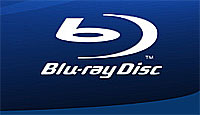 Paramount was one of the first major content players to back the Toshiba/NEC-developed HD-DVD format, with other major backers including Warner Home Video, HBO, New Line Cinema, Universal Pictures and Sanyo Electric, followed by Intel and Microsoft last week.
Paramount was one of the first major content players to back the Toshiba/NEC-developed HD-DVD format, with other major backers including Warner Home Video, HBO, New Line Cinema, Universal Pictures and Sanyo Electric, followed by Intel and Microsoft last week.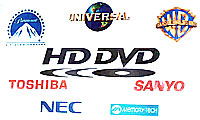 Influential in Paramount’s decision was the PlayStation 3’s support for Blu-ray Disc.
Influential in Paramount’s decision was the PlayStation 3’s support for Blu-ray Disc. The UK production and development community is in danger of losing out to competition from overseas if it doesn’t wake up to the potential of mobile TV, said Mark Selby, Nokia’s Global Vice President for Multimedia, (pictured right) at the inaugural Mobile TV forum in London today.
The UK production and development community is in danger of losing out to competition from overseas if it doesn’t wake up to the potential of mobile TV, said Mark Selby, Nokia’s Global Vice President for Multimedia, (pictured right) at the inaugural Mobile TV forum in London today. But many claimed that the lack of spectrum is holding DVB-H back in the UK.
But many claimed that the lack of spectrum is holding DVB-H back in the UK. Digital One owns the UK’s only nationwide commercial DAB multiplex – but the capacity allocated for DMB is minimal.
Digital One owns the UK’s only nationwide commercial DAB multiplex – but the capacity allocated for DMB is minimal. Skype has today announced a new version of their Windows release of Skype.For the first time, several more functions are added to make Skype both a more serious communication tool, and at the same time, more frivolous.First the serious side. v1.4, which has been in beta since August, includes call forwarding for when you aren’t sitting by your computer, or if you’re a little more advanced, you’ve dropped out of WiFi range on your handheld version. If Skype finds you unreachable, you can set it to forward your calls to up to three landlines, or mobiles. The forwarding for the person initiating the call is free, with the Skype user paying for the privilege from their SkypeOut minutes.We see the Real Excitement is around the ability to forward calls from one Skype ID to another, giving the ability to have more than one Skype ID. Until now this had to be handled by all sorts of complexity of running two versions, separate from each other. Calls forwarded to another Skype ID are free.What the significance of the whole of Call Forwarding? Your SkypeIn number, or Skype ID becomes your first point of contact, something we’ve seen before with Unified Messaging (UM). UM didn’t set the world alight when it came to techy attention 2-3 years ago, but Skype has timed this perfectly, realising that people are now ready.
Skype has today announced a new version of their Windows release of Skype.For the first time, several more functions are added to make Skype both a more serious communication tool, and at the same time, more frivolous.First the serious side. v1.4, which has been in beta since August, includes call forwarding for when you aren’t sitting by your computer, or if you’re a little more advanced, you’ve dropped out of WiFi range on your handheld version. If Skype finds you unreachable, you can set it to forward your calls to up to three landlines, or mobiles. The forwarding for the person initiating the call is free, with the Skype user paying for the privilege from their SkypeOut minutes.We see the Real Excitement is around the ability to forward calls from one Skype ID to another, giving the ability to have more than one Skype ID. Until now this had to be handled by all sorts of complexity of running two versions, separate from each other. Calls forwarded to another Skype ID are free.What the significance of the whole of Call Forwarding? Your SkypeIn number, or Skype ID becomes your first point of contact, something we’ve seen before with Unified Messaging (UM). UM didn’t set the world alight when it came to techy attention 2-3 years ago, but Skype has timed this perfectly, realising that people are now ready. Personalisation
Personalisation SanDisk have unveiled their “fingernail-sized” new TrustedFlash cards, a technology that embeds Digital Rights Management (DRM) and decryption technology into memory cards, and also includes a subscription manager enabling the cards to be used for digital subscription music services.
SanDisk have unveiled their “fingernail-sized” new TrustedFlash cards, a technology that embeds Digital Rights Management (DRM) and decryption technology into memory cards, and also includes a subscription manager enabling the cards to be used for digital subscription music services. Harar stated that the TrustedFlash card would act like current SD cards, with the technology able to be extend into on-demand content such as feature films and online games.
Harar stated that the TrustedFlash card would act like current SD cards, with the technology able to be extend into on-demand content such as feature films and online games.